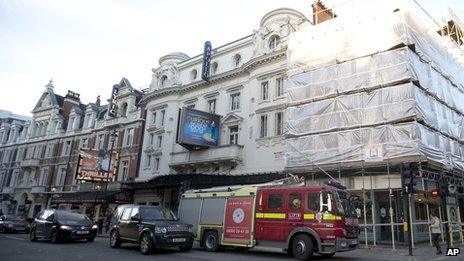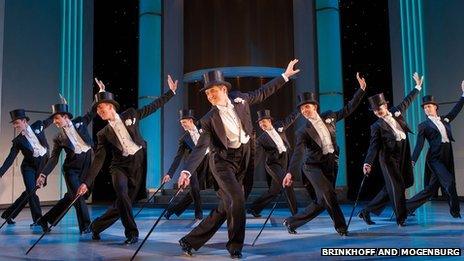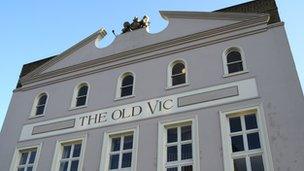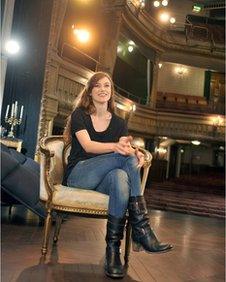How safe is London's Theatreland?
- Published

The Apollo Theatre dates back to 1901 and is Grade II listed
As investigators continue their work to establish what caused the ceiling to collapse at London's Apollo Theatre, theatre bosses and critics disagree on what shape West End theatres are really in.
More than 32,000 people attend the theatre in central London every night, according to the Society of London Theatre (Solt), which represents the producers, theatre owners and managers of 52 venues.
It said all of them undergo "rigorous safety checks and inspections", and both Solt and The Theatres Trust have today rushed to assure theatre-goers that occurrences such as that at the Apollo are "extremely rare".
The Stage critic Mark Shenton, external, who often posts pictures online of theatres in disrepair, told the BBC he believed "the state of some West End theatres beggars belief".
But Mhora Samuel, director of The Theatres Trust, which looks after buildings across the whole of the UK, said: "The public should be reassured that theatre owners carry out regular plasterwork inspections and maintenance regimes to ensure the safety of their buildings."
The Trust told the BBC that all theatres have what is known as a ceiling certificate, with all inspections "certified by independent experts".
Solt also confirmed at a meeting with all of the city's major theatre owners on the morning after the accident that all of their safety inspections and certificates are up to date.
It added that the capital's theatres all took "the safety of their audience, performers and staff very seriously".
The majority are Victorian buildings, including the Apollo, which dates back to 1901 and is Grade II listed.
'Lack of investment'
While there have been reassurances that this accident was a one-off, there have been several incidents where the structure of a theatre has been an issue.
In September, plaster fell on the stage at the Aldwych Theatre during a performance of the musical Top Hat. No-one was hit but the matinee was halted and subsequently abandoned.

A performance of the musical Top Hat had to be halted in Sepember
The Royal Court received an emergency £300,000 grant from the Arts Council last year for "immediate and unexpected repairs".
And in 2011 the Comedy Theatre - now the Harold Pinter Theatre - cancelled a performance of The Children's Hour starring Keira Knightley at short notice for "essential building repairs".
Back in 2004, 15 people were injured when plaster fell from the ceiling of the Theatre Royal Haymarket.
Also in 2004, Andrew Lloyd Webber, who at the time owned the Apollo, suggested in the House of Lords that some of London's listed theatres should be demolished rather than restored.
At the Old Vic, meanwhile, a major refurbishment is planned, one of the objectives being to repair a historic leak in the roof.

The roof of the Old Vic was damaged by a bomb during World War II
The Sunday Telegraph's theatre critic Tim Walker believes that there has been "under-investment" in London theatres.
"I've been in theatres and you think, my goodness, they haven't even been in here with a Hoover for a long time. There is an element of neglect. They should be a lot more modern and a lot more user-friendly," said Walker.
He added: "According to the latest figures, the West End is making about half a billion pounds of profit a year.
"I think when profits get that big, you start to wonder whether or not they're actually spending the money on reinvesting in their theatres, which are very old."
'Safe to attend'
Westminster Council told the BBC that the investigation into what happened at the Apollo on Thursday "will take some time".
Nicola Aiken, the council's cabinet member for community protection, told Radio 4's Today programme that district surveyors had "declared that the ceiling structure is sound and only plaster fell".

Keira Knightley on the stage of the Comedy Theatre in 2010
She added that they had been carrying out checks on all historic theatres' consents and licensing "because we want to reassure theatre-goers that theatres are safe to attend".
Shenton told the BBC he thought all West End theatres should have a new survey done "immediately" or face a "fundamental lack of trust" from audiences.
"I seriously don't think performances can go ahead until that happens," he said.
However, the Society of London Theatre has confirmed that all venues, apart from the Apollo, will remain open for business.
Performances of The Curious Incident of the Dog in the Night-Time have been cancelled up until 4 January 2014.
The Apollo is situated at the heart of London's Theatreland on the north side of Shaftesbury Avenue, along with the Lyric, the Gielgud and the Queen's.
The one-off Renaissance-style design was architect Lewen Sharp's only complete theatre. Since being built in 1901 it has only been altered in 1932 and 1991, according to The Theatre Trust's records, external.
Restoration levy
Brian Atwood, external, editor of The Stage, said that until the results of the investigation "we should avoid simplistic assumptions that old theatre equals public danger".
He said the "Apollo disaster needs action and reflection" and that more money needed to be spent looking after West End theatres as "preservation does warrant investment".

Sir Cameron Mackintosh's theatre group owns seven West End theatres
Mark Field, MP for Cities of London and Westminster, said there had already been "a significant amount of investment in the fabric of many of central London's theatres in recent years".
But he added: "Clearly quite a lot of Theatreland does go back 100 years or more. There's been a significant programme of renovation in the last 10 years, but given that we've got 40 or 50 theatres in the whole West End it clearly won't have applied to every one of them."
Many London theatres, including those run by the three big owners - the Apollo's owners Nimax, Andrew Lloyd Webber's Really Useful Group and Cameron Mackintosh's Delfont Mackintosh - include a £1.50 "restoration levy" in the ticket price that goes towards the venue's up-keep.
However, critics such as Shenton have argued that there is a lack of transparency over how it is spent. He is in favour of "a central body" collecting and distributing the funds.
- Published20 December 2013
- Published20 December 2013
- Published20 December 2013
- Published20 December 2013
- Published20 December 2013
- Published20 December 2013